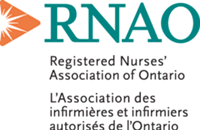RNAO statement in response to the government's announcement on increasing direct care for long-term care resident to four hours per day
TORONTO, Nov. 3, 2020 /CNW/ - RNAO is shocked by the lack of urgency in Monday's announcement from the provincial government that they intend to meet minimum quality care standards in Ontario's nursing homes by 2025. Urgent action and not an election promise is needed to protect the lives of nursing home residents as the province is now in the grips of a ferocious resurgence of COVID-19. As of Nov. 1, nearly 10 months into the pandemic, 74 nursing homes across the province are again battling COVID-19 outbreaks with insufficient staffing and resources.
For more than two-decades, in report after report, experts have warned of staffing and funding shortages in the long-term care sector. Long before - as well as throughout – this pandemic, RNAO has insisted on the need to bolster direct nursing and personal support care to nursing home residents to protect their health, safety, and dignity. RNAO's discussed this matter in-person with Minister of Long-Term Care Merrilee Fullerton ahead of the pandemic and presented the evidence behind its Nursing Home Basic Care Guarantee. The guarantee reflects the consensus of experts and provides the government with a ready-made plan and evidence-based minimum standards for protecting Ontario's vulnerable nursing home residents.
With more than 2,000 residents and eight staff of the province's 626 nursing homes already dead from COVID-19-related illnesses and their families and staff in anguish, RNAO says it is negligent and disingenuous for the government to announce that it will achieve minimum standards of quality care in Ontario's nursing homes only five years from now. Delayed timelines for minimum, evidence-based standards of care will result in more preventable lives lost during COVID-19 and afterwards.
RNAO's calls on the government to move ahead quickly with Bill 13 –Time to Care Act – including the bill's Royal Assent before the end of this year. The bill passed second reading unanimously on Oct. 29 and calls for amendments to the Long-Term Care Homes Act to establish a minimum of four worked hours of nursing and personal support services per resident, per day in all Ontario nursing homes. In the absence of legislative changes, Ontarians can expect to continue hearing more horror stories, with more reports and inquiries to follow, and with little action for decades to come.
The Registered Nurses' Association of Ontario (RNAO) is the professional association representing registered nurses, nurse practitioners and nursing students in Ontario. Since 1925, RNAO has advocated for healthy public policy, promoted excellence in nursing practice, increased nurses' contribution to shaping the health system and influenced decisions that affect nurses and the public they serve. For more information about RNAO, visit our website at RNAO.ca or follow us on Facebook and Twitter.
SOURCE Registered Nurses' Association of Ontario

Marion Zych, Director of Communications, Registered Nurses' Association of Ontario (RNAO), Cell: 647-406-5605, [email protected]; Victoria Alarcon, Communications Specialist/Coordinator, Registered Nurses' Association of Ontario (RNAO), Phone: 416-408-5610, [email protected]

Share this article